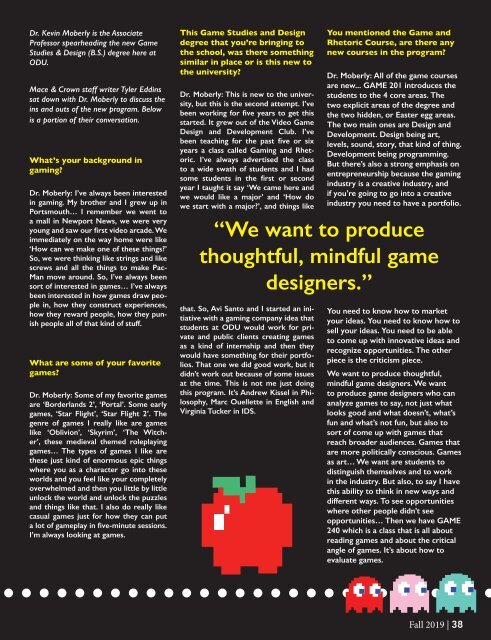Fall 2019
Fall 2019 Mace and Crown Newsmagazine
Fall 2019 Mace and Crown Newsmagazine
- No tags were found...
Create successful ePaper yourself
Turn your PDF publications into a flip-book with our unique Google optimized e-Paper software.
Dr. Kevin Moberly is the Associate<br />
Professor spearheading the new Game<br />
Studies & Design (B.S.) degree here at<br />
ODU.<br />
Mace & Crown staff writer Tyler Eddins<br />
sat down with Dr. Moberly to discuss the<br />
ins and outs of the new program. Below<br />
is a portion of their conversation.<br />
What’s your background in<br />
gaming?<br />
Dr. Moberly: I’ve always been interested<br />
in gaming. My brother and I grew up in<br />
Portsmouth… I remember we went to<br />
a mall in Newport News, we were very<br />
young and saw our first video arcade. We<br />
immediately on the way home were like<br />
‘How can we make one of these things?’<br />
So, we were thinking like strings and like<br />
screws and all the things to make Pac-<br />
Man move around. So, I’ve always been<br />
sort of interested in games… I’ve always<br />
been interested in how games draw people<br />
in, how they construct experiences,<br />
how they reward people, how they punish<br />
people all of that kind of stuff.<br />
What are some of your favorite<br />
games?<br />
Dr. Moberly: Some of my favorite games<br />
are ‘Borderlands 2’, ‘Portal’. Some early<br />
games, ‘Star Flight’, ‘Star Flight 2’. The<br />
genre of games I really like are games<br />
like ‘Oblivion’, ‘Skyrim’, ‘The Witcher’,<br />
these medieval themed roleplaying<br />
games… The types of games I like are<br />
these just kind of enormous epic things<br />
where you as a character go into these<br />
worlds and you feel like your completely<br />
overwhelmed and then you little by little<br />
unlock the world and unlock the puzzles<br />
and things like that. I also do really like<br />
casual games just for how they can put<br />
a lot of gameplay in five-minute sessions.<br />
I’m always looking at games.<br />
This Game Studies and Design<br />
degree that you’re bringing to<br />
the school, was there something<br />
similar in place or is this new to<br />
the university?<br />
Dr. Moberly: This is new to the university,<br />
but this is the second attempt. I’ve<br />
been working for five years to get this<br />
started. It grew out of the Video Game<br />
Design and Development Club. I’ve<br />
been teaching for the past five or six<br />
years a class called Gaming and Rhetoric.<br />
I’ve always advertised the class<br />
to a wide swath of students and I had<br />
some students in the first or second<br />
year I taught it say ‘We came here and<br />
we would like a major’ and ‘How do<br />
we start with a major?’, and things like<br />
that. So, Avi Santo and I started an initiative<br />
with a gaming company idea that<br />
students at ODU would work for private<br />
and public clients creating games<br />
as a kind of internship and then they<br />
would have something for their portfolios.<br />
That one we did good work, but it<br />
didn’t work out because of some issues<br />
at the time. This is not me just doing<br />
this program. It’s Andrew Kissel in Philosophy,<br />
Marc Ouellette in English and<br />
Virginia Tucker in IDS.<br />
You mentioned the Game and<br />
Rhetoric Course, are there any<br />
new courses in the program?<br />
Dr. Moberly: All of the game courses<br />
are new... GAME 201 introduces the<br />
students to the 4 core areas. The<br />
two explicit areas of the degree and<br />
the two hidden, or Easter egg areas.<br />
The two main ones are Design and<br />
Development. Design being art,<br />
levels, sound, story, that kind of thing.<br />
Development being programming.<br />
But there’s also a strong emphasis on<br />
entrepreneurship because the gaming<br />
industry is a creative industry, and<br />
if you’re going to go into a creative<br />
industry you need to have a portfolio.<br />
“We want to produce<br />
thoughtful, mindful game<br />
designers.”<br />
You need to know how to market<br />
your ideas. You need to know how to<br />
sell your ideas. You need to be able<br />
to come up with innovative ideas and<br />
recognize opportunities. The other<br />
piece is the criticism piece.<br />
We want to produce thoughtful,<br />
mindful game designers. We want<br />
to produce game designers who can<br />
analyze games to say, not just what<br />
looks good and what doesn’t, what’s<br />
fun and what’s not fun, but also to<br />
sort of come up with games that<br />
reach broader audiences. Games that<br />
are more politically conscious. Games<br />
as art… We want are students to<br />
distinguish themselves and to work<br />
in the industry. But also, to say I have<br />
this ability to think in new ways and<br />
different ways. To see opportunities<br />
where other people didn’t see<br />
opportunities… Then we have GAME<br />
240 which is a class that is all about<br />
reading games and about the critical<br />
angle of games. It’s about how to<br />
evaluate games.<br />
<strong>Fall</strong> <strong>2019</strong> | 38




